Brunello Cuccinelli, CEO, Designer and Founder of his namesake brand discusses his humble beginnings in a small Italian hamlet, that lead to incredible global success
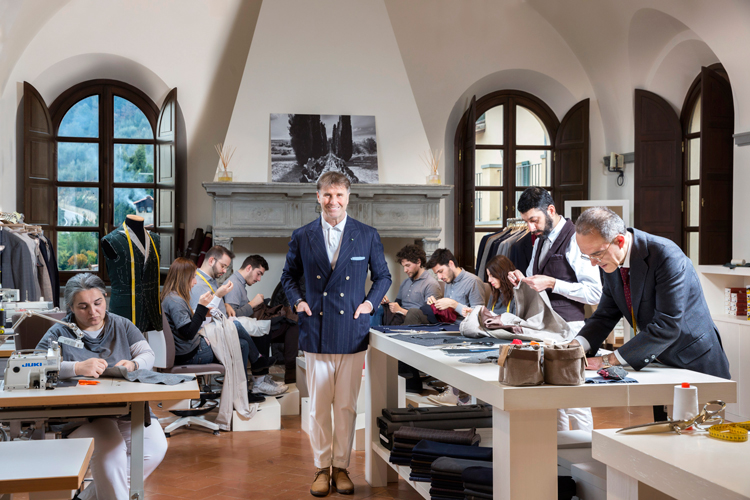
Brunello Cucinelli is a true rags to riches story. Born in a rural community in the area of Perugia in Italy, Cucinelli grew up in a home that had no electricity or running water. But this proud Italian had bigger plans for his life. In 1977 he started making dyed cashmere in a small workshop, close to his hometown. Cucinelli founded his fashion brand Brunello Cucinelli in 1978 with around just 500 euros. With hard work and passion, Cucinelli was about to take his business from a small humble company to a global enterprise.
As his creations started to grow in popularity in Italy, he had the vision to take his company to a much larger scale. He found a gap in the market for coloured cashmere for women and this saw huge attention and spent 20 years providing luxury quality cashmere to women. In the 1990s the businessman grew his product line with an offering for men and by 1998 he was selling 200,000 cashmere jumpers a year. But this was only just the beginning. He started to get attention from America, where customers were excited by the idea of expertly made cashmere from Italy and in just six years his company generated revenue of around a staggering 450 million euros by 2013.
Today he is the CEO and Designer at the Brunello Cucinelli this global enterprise, but one thing is for sure, this hugely successful businessman remains true to his roots. With his company headquarters and factories mostly in Solemeo; the 14th-century hamlet that he grew up in, Cucinelli has provided jobs for thousands of local people over the years and has given back to the community in incredible ways by restoring much of the hamlet over the past two decades. Solomeo lies deep in Brunello’s heart as it represents the core of his family, business and spiritual life. He had restored many of the medieval buildings in the area, established the School of Art and Crafts, as well as the Theatre Cucinelli, a Renaissance-style open-air theatre that hosts plays, concerts and ballet shows that highlight the history of the hamlet.
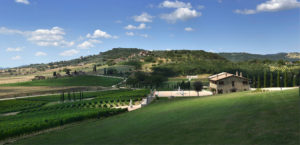
Solomeo Valley
In 2018, Cucinelli unveiled a monument titled “Tribute to Human Dignity”. The five-metre high monument was built according to an ancient technique using blocks of travertine. To express the universal nature of this structure, the name of the five continents of the world is listed under each arch, again in bronze: AMERICA, EUROPE, AFRICA, ASIA, OCEANIA. Africa is located beneath the central arch to commemorate man’s original home. This iconic landmark was designed to last centuries and represent the arts and crafts celebrated in this hamlet and their connection to the world of Brunello Cucinelli.
Here we discuss with Brunello Cucinelli his passion and love for Italy, in particular, the area from which he is from, and how this passion inspired him to achieve his dreams.
How would you describe Italy through your eyes?
I see Italy as one of the most charming countries in the world, for its artistic heritage, for the beauty of the places, the variety of cultures, inexhaustible and unique creativity… and after all, it is where I was born!
Tell us more about the importance of “Made in Italy” and why do you think there is such a fascination with this concept globally?
“Made in Italy” means a guarantee of handmade products, with the same features as when craftsmen were true artists. Products that are made in Italy are handcrafted goods and they therefore last a long time and – when necessary – can be mended or repaired. Its humanistic nature is one of the factors that make “Made in Italy” attractive worldwide.
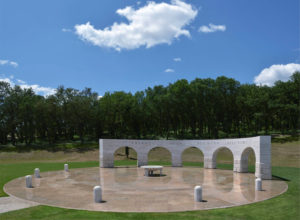
Tribute to the Dignity of Man Monument
How do you think the values and culture of Italy are seen throughout Brunello Cucinelli?
They are seen through Brunello Cucinelli because it is a true Italian brand. When I travel to any country in the world, one of the greatest pleasures for me is the opportunity to get to know the genuine life of new places, the customs, the food, and the habits of my guests. This is knowledge. The Brunello Cucinelli brand conveys knowledge of Italy to the world, and this is the reason why it is so endearingly appreciated.
You built your brand from a small humble workshop and have seen it grow to a global fashion house – how proud are you of what you have accomplished so far and how do you think Italian culture has influenced that growth and make it possible?
It is not easy – even for me – to retrace how it all happened because, especially in the early days, we were fully focused on the quality of the product and lived on a daily basis. But I believe that a great Italian heritage does not last for centuries for no reason. It doesn’t happen very often that a country can enrich its heritage with so many different cultures: Greek, Latin, Arabic, Germanic, French, and Spanish. This wealth is one of the strongest reasons for our success, and I am more proud of it than of my own work.
Italy has suffered greatly throughout the global pandemic we are currently experiencing – when all of this is over what do you expect to see from the recovery of this crisis?
When all this is over, it will be enough to chase away the ghosts and keep a warm heart and a cold mind. If we can start again at the same pace from the exact point where we had to stop, and if we don’t yield to haste, the time to return to normality will be very short. Crises are cyclical in history, but structural crises, such as the one that hit us in 2008, when no one could understand what was going on, are one thing; temporary crises, such as today’s one, are something different, as the way ahead is much clearer.
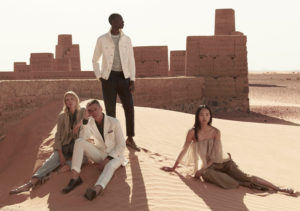
Spring/summer 2020 campaign
When all of this is over will you change any of the strategies of the brand and has it had an impact on how you will move forward?
It is still too early to talk about changes in business strategy. I don’t see the need for that at the moment. We will have to wait for the markets’ reaction on an international level, the common sentiment, the new expectations; I can, however, say that any needed changes will always comply and be in keeping with the humanistic identity of the company because this is our most authentic meaning.
Growing up, what is your first memory of Italy?
The memory of my uncle Giuseppe Garibaldi who moved to France spoke fabulous words of, recalling wonderful adventures set in glorious Italy, full of passion and humanity.
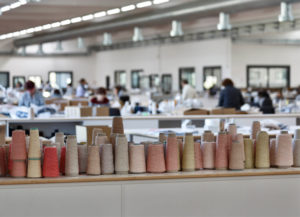
Solomeo Headquarters
Can you share with us any Italian traditions that you to this day continue with your family and friends?
I am not sure that they are typically Italian, perhaps they are universal: but they all revolve around the value of friendship. One of our traditions is a dinner party that we organise two or three times a year with some friends of my wife Federica’s and mine, people we grew up within a relationship that has never stopped. The other tradition is a football match, which takes place almost every week with the same friends.
What’s your favourite Italian dish to eat?
Toasted bread with olive oil on top.
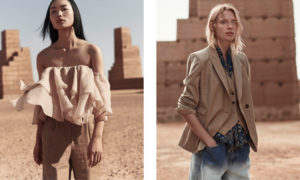
Spring/Summer 2020
What’s your favourite Italian phrase?
“The love that moves the sun and the other stars.”
READ MORE:
Alberto Camerlengo CEO of Furla on the Uniqueness of the Brand and Its Global Success
Riccardo Sciutto CEO of Sergio Rossi on the History and Heritage of the Italian Shoemaker















